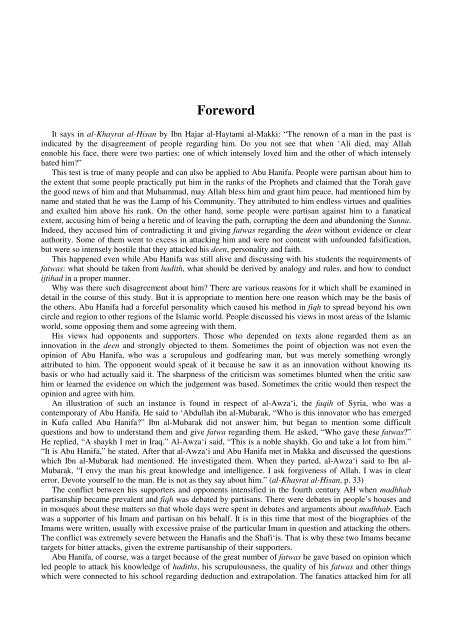Create successful ePaper yourself
Turn your PDF publications into a flip-book with our unique Google optimized e-Paper software.
Foreword<br />
It says in al-Khayrat al-<strong>His</strong>an by Ibn Hajar al-Haytami al-Makki: “The renown of a man in the past is<br />
indicated by the disagreement of people regarding him. Do you not see that when ‘Ali died, may Allah<br />
ennoble his face, there were two parties: one of which intensely loved him <strong>and</strong> the other of which intensely<br />
hated him?”<br />
This test is true of many people <strong>and</strong> can also be applied to <strong>Abu</strong> <strong>Hanifa</strong>. People were partisan about him to<br />
the extent that some people practically put him in the ranks of the Prophets <strong>and</strong> claimed that the Torah gave<br />
the good news of him <strong>and</strong> that Muhammad, may Allah bless him <strong>and</strong> grant him peace, had mentioned him by<br />
name <strong>and</strong> stated that he was the Lamp of his Community. They attributed to him endless virtues <strong>and</strong> qualities<br />
<strong>and</strong> exalted him above his rank. On the other h<strong>and</strong>, some people were partisan against him to a fanatical<br />
extent, accusing him of being a heretic <strong>and</strong> of leaving the path, corrupting the deen <strong>and</strong> ab<strong>and</strong>oning the Sunna.<br />
Indeed, they accused him of contradicting it <strong>and</strong> giving fatwas regarding the deen without evidence or clear<br />
authority. Some of them went to excess in attacking him <strong>and</strong> were not content with unfounded falsification,<br />
but were so intensely hostile that they attacked his deen, personality <strong>and</strong> faith.<br />
This happened even while <strong>Abu</strong> <strong>Hanifa</strong> was still alive <strong>and</strong> discussing with his students the requirements of<br />
fatwas: what should be taken from hadith, what should be derived by analogy <strong>and</strong> rules, <strong>and</strong> how to conduct<br />
ijtihad in a proper manner.<br />
Why was there such disagreement about him? There are various reasons for it which shall be examined in<br />
detail in the course of this study. But it is appropriate to mention here one reason which may be the basis of<br />
the others. <strong>Abu</strong> <strong>Hanifa</strong> had a forceful personality which caused his method in fiqh to spread beyond his own<br />
circle <strong>and</strong> region to other regions of the Islamic world. People discussed his views in most areas of the Islamic<br />
world, some opposing them <strong>and</strong> some agreeing with them.<br />
<strong>His</strong> views had opponents <strong>and</strong> supporters. Those who depended on texts alone regarded them as an<br />
innovation in the deen <strong>and</strong> strongly objected to them. Sometimes the point of objection was not even the<br />
opinion of <strong>Abu</strong> <strong>Hanifa</strong>, who was a scrupulous <strong>and</strong> godfearing man, but was merely something wrongly<br />
attributed to him. The opponent would speak of it because he saw it as an innovation without knowing its<br />
basis or who had actually said it. The sharpness of the criticism was sometimes blunted when the critic saw<br />
him or learned the evidence on which the judgement was based. Sometimes the critic would then respect the<br />
opinion <strong>and</strong> agree with him.<br />
An illustration of such an instance is found in respect of al-Awza‘i, the faqih of Syria, who was a<br />
contemporary of <strong>Abu</strong> <strong>Hanifa</strong>. He said to ‘Abdullah ibn al-Mubarak, “Who is this innovator who has emerged<br />
in Kufa called <strong>Abu</strong> <strong>Hanifa</strong>?” Ibn al-Mubarak did not answer him, but began to mention some difficult<br />
questions <strong>and</strong> how to underst<strong>and</strong> them <strong>and</strong> give fatwa regarding them. He asked, “Who gave these fatwas?”<br />
He replied, “A shaykh I met in Iraq.” Al-Awza‘i said, “This is a noble shaykh. Go <strong>and</strong> take a lot from him.”<br />
“It is <strong>Abu</strong> <strong>Hanifa</strong>,” he stated. After that al-Awza‘i <strong>and</strong> <strong>Abu</strong> <strong>Hanifa</strong> met in Makka <strong>and</strong> discussed the questions<br />
which Ibn al-Mubarak had mentioned. He investigated them. When they parted, al-Awza‘i said to Ibn al-<br />
Mubarak, “I envy the man his great knowledge <strong>and</strong> intelligence. I ask forgiveness of Allah. I was in clear<br />
error. Devote yourself to the man. He is not as they say about him.” (al-Khayrat al-<strong>His</strong>an, p. 33)<br />
The conflict between his supporters <strong>and</strong> opponents intensified in the fourth century AH when madhhab<br />
partisanship became prevalent <strong>and</strong> fiqh was debated by partisans. There were debates in people’s houses <strong>and</strong><br />
in mosques about these matters so that whole days were spent in debates <strong>and</strong> arguments about madhhab. Each<br />
was a supporter of his <strong>Imam</strong> <strong>and</strong> partisan on his behalf. It is in this time that most of the biographies of the<br />
<strong>Imam</strong>s were written, usually with excessive praise of the particular <strong>Imam</strong> in question <strong>and</strong> attacking the others.<br />
The conflict was extremely severe between the Hanafis <strong>and</strong> the Shafi‘is. That is why these two <strong>Imam</strong>s became<br />
targets for bitter attacks, given the extreme partisanship of their supporters.<br />
<strong>Abu</strong> <strong>Hanifa</strong>, of course, was a target because of the great number of fatwas he gave based on opinion which<br />
led people to attack his knowledge of hadiths, his scrupulousness, the quality of his fatwas <strong>and</strong> other things<br />
which were connected to his school regarding deduction <strong>and</strong> extrapolation. The fanatics attacked him for all














